
The Cancer Consortium is organized into nine highly collaborative research programs that are discipline- or disease-specific, bringing together over 650 faculty with research interests in basic, clinical/translational, public health sciences and global health.
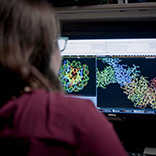
Biostatistics & Computational Biology
The Biostatistics & Computational Biology (BCB) program is dedicated to the use and improvement of quantitative and data sciences to support and advance cancer research. The program’s ultimate goals are to develop rigorous statistical and mathematical models for personalized and predictive medicine, to generate and implement computational and mathematical methods that increase our understanding of cancer, and to establish and disseminate new statistical and computational methods of cancer research.
Our work focuses on the intersection of data science and translational cancer research. From statistical methods development to biological research that combines experimental and computational methods, members of the BCB program span a wide array of skill sets and expertise. Notable achievements in recent years include new therapeutic avenues for treatment of leukemias and the discovery of novel predictive markers of immunotherapy response.
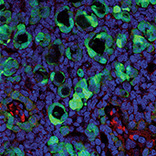
Breast & Ovary Cancers
The Breast & Ovary Cancers (BOC) program seeks to improve outcomes for breast and ovarian cancer through research to better understand, detect, and treat these cancers. The program’s goals are twofold: to improve methods for assessing risk, diagnosing, and preventing breast and ovarian cancers; and to develop more effective personalized therapies for patients.
Our work encompasses the entirety of the cancer timeline, from prevention and diagnosis to treatment and survivorship. Given the high incidence of breast and ovarian cancers in the Consortium’s catchment area, our members are dedicated to working with community partners to understand disparities in outcomes across the state and to improving early detection, prevention, and treatment for underserved populations in Washington. Notable achievements in recent years include extensive investigation of the genetic components of breast and ovary cancers, development of PARP inhibitors for treating these cancers, and improved imaging for early detection and monitoring of breast cancer.

Cancer Basic Biology
The Cancer Basic Biology Program is dedicated to biological research that advances knowledge of cancer. The specific goals of the program are to expand our understanding of the biological mechanisms underlying cancer, particularly with regard to gene expression and phenotype in both normal and cancer cells, to use these findings to fuel developments in diagnosis clinical applications, and to identify and hone new methodologies and tools for cell and molecular analysis.
As the fundamental science program of the Consortium, our work sits at the intersection of basic cell biology and translational cancer research. Our members’ work addresses a diverse range of topics, from epigenomics to protein structure, yet each is focused on answering a different aspect of the question of how normal cells become cancer cells. Collectively, we support translational and applied research in other programs.

Cancer Epidemiology, Prevention & Control
The Cancer Epidemiology, Prevention & Control (CEPC) program seeks to reduce the population burden of cancer by studying the pillars of cancer control: etiology, early detection, prevention, and survivorship. More specifically, CEPC research focuses on risk factors for cancer incidence, morbidity, mortality; late effects of treatment; and the development of effective and targeted cancer prevention strategies.
Our research addresses cancer prevention and survivorship at the individual, clinical, and community level. Our members are dedicated to understanding the environmental, lifestyle, sociocultural, and endogenous causes of cancer occurrence and progression, and to identifying and optimizing new and existing strategies for cancer screening and prevention. CEPC research is highly interdisciplinary, and members bring broad expertise in epidemiology, health economics, nutrition science, molecular biology, health behavior, cancer disparities, and dissemination and implementation science. Key CEPC program resources include the Cancer Surveillance System (CSS), the Hutchinson Institute for Cancer Outcomes Research (HICOR), the University of WA’s Health Promotion Research Center (UW HPRC) and the Center for Community Health Promotion (CCHP) in Sunnyside, WA. Notable CEPC achievements in recent years include the discovery of risk-predicting loci for colorectal, esophageal, and breast cancer; the identification and characterization of the heightened risk of financial toxicity for cancer patients and their families; and the development of effective strategies for smoking cessation.
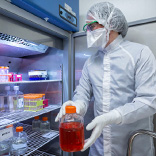
Cancer Immunology
The Cancer Immunology (CI) program seeks to better understand the immunology of cancer and to continue pushing the frontiers of immunotherapeutic approaches to cancer treatment. Our efforts are focused on developing safe and effective immunotherapies for hematologic malignancies and solid tumors in both adult and pediatric contexts, eliminating barriers to immune-mediated cancer treatments, and continuing to explore new clinical applications based on research in basic immunology and synthetic biology.
Our members’ research areas include the genetic manipulation of T cells, the combination of engineered T cells with antibodies and other small molecules, synthetic biology, and the relationship between tumors and host immunity. Recent advances in the program’s work include groundbreaking trials involving CD19 CAR T cells, the use of DNA nanocarriers in conjunction with therapeutic T cells, the elucidation thymic regeneration mechanisms, and the extrication of human tissue immune alteration from tissue inflammation.
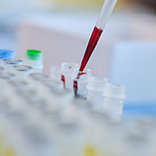
Hematologic Malignancies
The goal of the Hematologic Malignancies (HM) program is to better understand and treat hematologic malignancies and, ultimately, to reduce the cancer burden and deaths associated with them. The program accomplishes this by working to expand existing knowledge of the biologic basis of hematologic malignancies and normal blood cell functioning, and also exploring and perfecting new and existing treatments to hematologic malignancies, both transplant and non-transplant approaches.
Members of the program are focused on the translational application of their research. Recently, researchers have been successful in improving the efficacy and safety of marrow transplantation, antibody-based therapies, and gene therapy, which have had direct clinical applications and resulted in thousands of lives being saved.

Lung Cancer
The mission of the Lung Cancer (LC) program is to reduce the morbidity and mortality attributable to lung cancer, both within our catchment area and around the world. Lung cancer, which is the leading cause of cancer-related death worldwide, has historically been defined by its difficulty to detect in the early stages and limited treatment options in advanced stages.
To address these issues, members of the LC program are working to improve the efficacy of immune-based therapies for lung cancer patients; implement effective strategies for screening and early detection; and identify and exploit therapeutic vulnerabilities in small cell lung cancer (SCLC). The program's expertise spans many aspects of lung cancer research, including basic, translational, and population science; clinical research in both non-small cell lung cancer and small small cell lung cancer; and clinical expertise ion both thoracic oncology and pulmonary medicine.
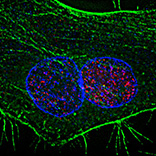
Pathogen Associated Malignancies
The purpose of the Pathogen Associated Malignancies (PAM) program is to understand, prevent, and treat pathogen-associated malignancies. More specifically, the program’s goals are to identify and understand the nature of host-pathogen interactions, particularly mechanisms of cancer induction and exploitable vulnerabilities; to translate this knowledge into strategies for better prevention and treatment; and to design approaches to reduce cancer burden as a result of pathogen-associated malignancies in low- and middle-income countries.
Members of the PAM program focus on a variety of different pathogens and cancers, including human papillomavirus (HPV) associated anogenital and oropharyngeal cancers, Merkel cell carcinoma, Kaposi sarcoma and other lymphomas, liver cancers caused by hepatitis B and C viruses, and lymphomas and epithelial cancers caused by Epstein Barr virus. The program is also interested in the role of certain bacteria and the human microbiome in promoting cancer and affecting treatment. Notable achievements in recent years include studies demonstrating the role of H. pylori in contributing to gastrointestinal neoplasia, as well as groundbreaking research around treatment of metastatic Merkel cell carcinoma using immune checkpoint inhibitors.

Prostate Cancer
The Prostate Cancer (PC) program is dedicated to advancing scientific knowledge of prostate cancer, with the ultimate goal of reducing the burden and mortality of that disease. In particular, the program aims to improve and devise methods of risk determination, detection, and prevention for prostate cancer and to develop therapeutic approaches to prostate cancer.
Of particular interest to program members are treatments based in the understanding and utilization of androgen receptor signaling, as well as those that function by inhibiting key oncogenic drivers and manipulating the tumor microenvironment. Noteworthy achievements in recent years include the discovery of a new subtype of prostate cancer, as well as the identification of the efficacy of supraphysiological androgen levels as a therapeutic strategy.